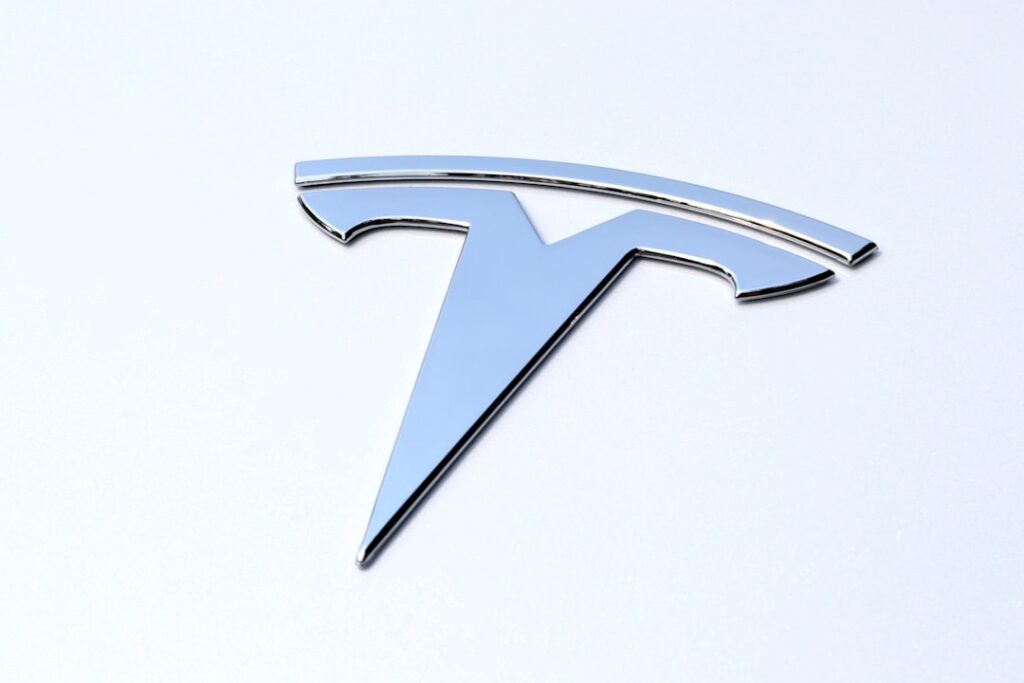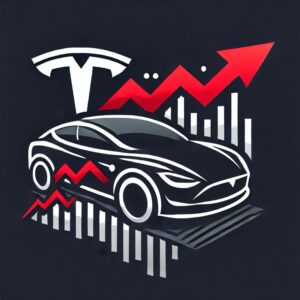

Tesla’s stock faces significant headwinds amid sales declines, high valuation concerns, and global competition, yet analysts remain divided on its long-term potential despite a 40% decline from 2024 highs.
Current Market Performance and Valuation Metrics
Tesla’s stock (TSLA) has experienced substantial volatility in early 2025, demonstrating the complex interplay between market sentiment, fundamental performance, and broader economic factors influencing the electric vehicle sector. As of February 28, 2025, Tesla shares are trading at approximately $290.075, representing a 2.88% increase from the previous day’s close but masking a much more concerning longer-term trend. The stock has tumbled dramatically from its December 2024 heights, shedding approximately 40% of its value in a downward trajectory that has accelerated in recent weeks[5]. This significant correction has reduced Tesla’s market capitalization to below $1 trillion, causing it to fall behind companies like Berkshire Hathaway and Broadcom in the rankings of America’s most valuable corporations[5].
The company’s financial metrics reveal a challenging valuation proposition for investors. Tesla currently trades at a price-to-earnings (P/E) ratio of approximately 138.33, a figure that starkly contrasts with traditional automakers and even exceeds that of many high-growth technology firms[3]. For contextual comparison, analysts point out that Toyota trades at a P/E of approximately 7, while Meta operates at a P/E of around 40[1]. This extraordinary premium reflects the market’s historical willingness to value Tesla based on future potential rather than current fundamentals – a proposition that becomes increasingly difficult to justify as the company faces growth challenges and intensifying competition.
Stock Performance Trends and Technical Analysis
The trajectory of Tesla’s stock in recent months reveals a narrative closely tied to political developments and investor sentiment shifts. Following Donald Trump’s re-election as president in November 2024, Tesla shares experienced a remarkable surge, climbing approximately 91% between November 5 and their peak closing price on December 17[2]. This rally was widely attributed to the perceived benefits Tesla might receive from the close relationship between CEO Elon Musk and President Trump, creating a period of extreme optimism that propelled the stock to unsustainable heights[2]. However, this technical rally occurred with minimal improvement in fundamental business metrics, setting the stage for the subsequent correction.
Since mid-December, Tesla’s downward trajectory has closely mirrored the movement of Bitcoin prices, suggesting a broader retreat from speculative investments and assets with connections to the Trump administration[2]. Additionally, Tesla’s recent performance has lagged behind other members of the “Magnificent Seven” group of dominant technology companies, including Microsoft, Amazon, and Meta, all of which have experienced more modest declines during the same period[2]. This comparative underperformance indicates that Tesla-specific factors are amplifying the correction beyond what might be expected from general market movements alone.
Fundamental Challenges and Global Market Position
Tesla’s fundamental business position has deteriorated on multiple fronts, creating legitimate concerns about the company’s ability to justify its premium valuation. In January 2025, Tesla reported weaker-than-expected fourth-quarter delivery numbers for 2024, with annual sales showing their first decline in over a decade – a startling reversal for a company whose growth narrative has been central to its investment thesis[5]. The subsequent earnings report revealed lower-than-expected quarterly profits, while management simultaneously reduced their sales outlook for 2025, further undermining investor confidence[5].
European and Chinese Market Dynamics
The European market, traditionally strong for Tesla, has shown alarming signs of weakness. Recent data indicates Tesla’s European sales have declined by approximately 50%, a substantial contraction that has contributed significantly to the stock’s recent selloff[1]. This regional deterioration suggests potential market saturation, increased competition, or both – concerning indicators for Tesla’s global growth strategy.
In China, Tesla’s second-largest market, the company faces even more substantial competitive pressures. Tesla currently commands just 6.1% of China’s new energy vehicle market, according to the China Passenger Car Association, putting it at a significant disadvantage compared to domestic rival BYD, which holds a commanding 32.5% market share[4]. This competitive imbalance has intensified as BYD recently announced it would offer its advanced driver assistance system at no additional cost for most of its models, potentially undermining a key Tesla competitive differentiator and revenue stream[4].
Full Self-Driving Technology and Regulatory Hurdles
Tesla’s Full Self-Driving (FSD) technology represents both a potential catalyst and a source of regulatory uncertainty. While the technology is available in the United States, Tesla has encountered significant challenges introducing it to the Chinese market, where regulatory approval remains elusive[4]. Reports suggest Chinese officials may be considering withholding approval for Tesla’s FSD system, a decision potentially influenced by geopolitical tensions and Elon Musk’s close relationship with President Trump[4].
The technology faces additional complications due to data security concerns, as China restricts Tesla from transferring training videos outside the country, while US regulations prevent the company from conducting training in China[4]. This regulatory deadlock has forced Tesla to implement a compromised solution that falls short of the capabilities available in the US market, potentially undermining Tesla’s technological edge in this crucial market[4].
Analyst Perspectives and Price Targets
The investment community remains deeply divided on Tesla’s prospects, with analyst ratings and price targets reflecting a broad spectrum of expectations. Tom Narayan from RBC Capital maintains a Buy rating on Tesla with an ambitious price target of $440, suggesting potential upside of over 50% from current levels[3]. Similarly, Morgan Stanley has reaffirmed its Buy recommendation with a $430 price target, indicating significant optimism about Tesla’s longer-term prospects despite near-term challenges[3].
Contrasting Viewpoints and Consensus Outlook
However, not all analysts share this optimistic outlook. Barclays analyst Dan Levy has expressed growing skepticism about Tesla’s ability to enhance profit margins, identifying several factors contributing to the recent stock decline[2]. According to Levy, Tesla’s impressive post-election rally was driven primarily by “a mix of intense excitement and technical aspects” while fundamental factors were largely overlooked[2]. The subsequent correction represents a market reassessment as attention shifts back to Tesla’s actual business performance and growth prospects.
The overall analyst consensus currently stands at “Hold,” with a price target consensus of $351.38, representing a potential upside of approximately 24.62% from current levels[3]. This mixed sentiment reflects the inherent uncertainty surrounding Tesla’s ability to overcome its current challenges while capitalizing on emerging opportunities in autonomous driving and energy storage.
Elon Musk’s Leadership and Political Connections
Elon Musk’s leadership and divided attention have emerged as significant factors influencing investor sentiment toward Tesla. Some market observers have expressed concern that Musk’s political activities and involvement with other ventures have detracted from his focus on Tesla’s operations during a critical period for the company[5]. This perception has been particularly damaging as Tesla confronts mounting competitive pressures and operational challenges that demand focused executive leadership.
Impact on International Relations and Business Opportunities
Musk’s close relationship with President Trump has created complex implications for Tesla’s international business, particularly in China. Analysts suggest this political alignment could potentially work against Tesla in securing regulatory approvals and government support in China, where the company has historically benefited from strong political and institutional backing[4]. The Shanghai Gigafactory, constructed in just ten months in 2019 at a cost 65% lower than comparable US facilities, exemplifies the advantages Tesla has previously enjoyed in China – advantages that may now be at risk due to geopolitical tensions[4].
Future Catalysts and Growth Opportunities
Despite current challenges, several potential catalysts could revitalize Tesla’s growth narrative and stock performance. The planned launch of Tesla’s robotaxi fleet in Austin in June 2025 represents one such opportunity, with some analysts suggesting it could serve as a significant positive catalyst for the stock[2]. However, expectations regarding this event remain tempered, with some predicting “growing interest leading up to the event, followed by a potential ‘sell the news’ response once it occurs”[2].
Manufacturing and Energy Storage Developments
Tesla’s expansion beyond passenger vehicles continues with recent developments in its energy storage business. Production has commenced at Tesla’s new “Megapack” factory, which manufactures large batteries designed for substantial electricity storage[4]. Located adjacent to existing facilities, this operation represents Tesla’s continued diversification beyond personal transportation into broader energy infrastructure, potentially opening new revenue streams less affected by automotive market volatility.
Investment Implications and Forward Outlook
The investment case for Tesla remains highly contingent on one’s time horizon and risk tolerance. For long-term investors who believe in Tesla’s technological leadership and eventual dominance in autonomous mobility, current price levels may represent an attractive entry point despite near-term volatility. Steve Sosnick, chief strategist at Interactive Brokers, notes that “The real difficulty with any stock that is as richly valued as Tesla is to be able to call a floor,” emphasizing that “a bottom is more about investor sentiment than the normal metrics that value investors might use”[5].
Competitive Positioning and Market Evolution
Tesla’s competitive positioning continues to evolve as traditional automakers and new entrants accelerate their electric vehicle initiatives. While Tesla maintains technological advantages in certain areas, competitors like BYD are rapidly closing the gap and leveraging cost advantages to gain market share. The company’s ability to maintain its premium brand positioning while addressing mid-market segments will be crucial for sustaining growth as the electric vehicle market matures from early adopters to mainstream consumers.
Conclusion
Tesla’s stock faces a critical juncture as the company navigates a complex landscape of operational challenges, valuation concerns, and competitive pressures. While the recent correction has brought valuations somewhat closer to fundamental realities, the stock continues to trade at a substantial premium to both automotive and technology peers, reflecting persistent optimism about Tesla’s long-term disruptive potential. For investors, the key question remains whether Tesla can overcome its current growth limitations and competitive threats while continuing to innovate in ways that justify its exceptional valuation metrics.
The coming quarters will prove decisive as Tesla attempts to reverse declining sales trends, secure regulatory approvals for advanced technologies, and demonstrate progress toward autonomous mobility solutions. Until clear evidence emerges of a return to strong growth and profitability improvement, Tesla’s stock may continue to experience heightened volatility as markets reassess the appropriate balance between the company’s visionary aspirations and its fundamental business realities.
Sources
[1] Tesla (TSLA) stock is crashing like a ‘soufflé under a sledge hammer’ as Elon Musk predicted https://electrek.co/2025/02/25/tesla-tsla-stock-is-crashing-like-a-souffle-under-a-sledge-hammer-as-elon-musk-predicted/
[2] Why Tesla’s stock is unraveling and what happens next, according to Barclays https://www.cnbc.com/2025/02/26/why-teslas-stock-is-unraveling-and-what-happens-next-according-to-barclays.html
[3] Tesla (TSLA) Receives a Buy from RBC Capital | Markets Insider https://markets.businessinsider.com/news/stocks/tesla-tsla-receives-a-buy-from-rbc-capital-1034425030
[4] Elon Musk’s proximity to Trump could work against him in Tesla’s number-two market https://www.cnn.com/2025/02/27/tech/china-tesla-fsd-challenges-musk-trump-intl-hnk/index.html
[5] Tesla tumbles further and there could be worse to come https://www.investmentnews.com/industry-news/tesla-tumbles-further-and-there-could-be-worse-to-come/259499
[6] News | Tesla https://www.tesla.com/blog
[7] Why is Tesla stock down 25% to start the year? https://www.newsnationnow.com/business/tesla-stock-elon-musk/
[8] Tesla Stock Price Analysis | Top Levels To Watch for February 27th … https://www.youtube.com/watch?v=544HbGTq7fQ
[9] TSLA Stock Quote Price and Forecast – CNN https://www.cnn.com/markets/stocks/TSLA
[10] Data show Tesla sales declined sharply in Europe https://www.npr.org/2025/02/27/nx-s1-5311609/tesla-sales-europe
[11] Tesla Stock Is On Pace For Its 2nd Worst Month Ever. Why Musk Is a Concern. https://www.barrons.com/articles/tesla-stock-worst-month-musk-c502c7be?mod=RTA
[12] Tesla (TSLA) Stock News Today – TipRanks.com https://www.tipranks.com/stocks/tsla/stock-news
[13] Tesla Shares Fall 8% as Post-Election Surge Dissipates https://www.nytimes.com/2025/02/25/business/tesla-stock-elon-musk-trump.html
[14] Tesla’s market value tumbles below $1 trillion as its Europe sales slump https://www.reuters.com/business/autos-transportation/teslas-market-value-tumbles-below-1-trillion-its-europe-sales-slump-2025-02-25/
[15] TSLA: Tesla Inc – Stock Price, Quote and News – CNBC https://www.cnbc.com/quotes/TSLA
[16] Tesla stock dips amid drop in sales, Musk’s political views https://www.bnnbloomberg.ca/video/shows/trading-day/2025/02/27/tesla-stock-dips-amid-drop-in-sales-musks-political-views/
[17] Tesla, Inc. (TSLA) Stock Price, News, Quote & History – Yahoo Finance https://finance.yahoo.com/quote/TSLA/
[18] Why Tesla Stock Is Headed for Its 2nd Worst Month on Record https://www.barrons.com/articles/tesla-stock-price-elon-musk-february-c502c7be
[19] Tesla, Inc. (TSLA) News Headlines | Nasdaq https://www.nasdaq.com/market-activity/stocks/tsla/news-headlines
[20] Tesla Stock Keeps Falling. It’s Testing Last-Ditch Support. https://www.investors.com/news/tesla-stock-falling-support/
